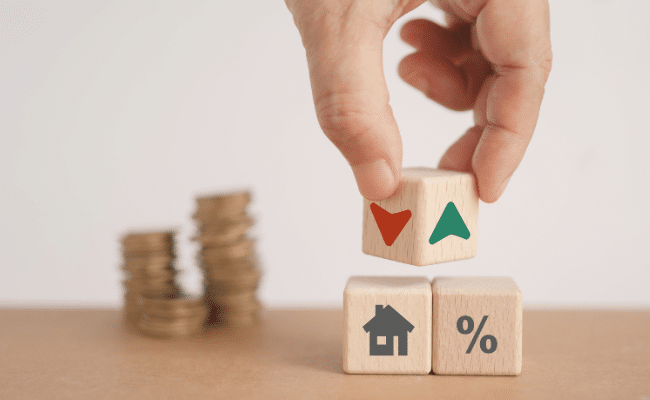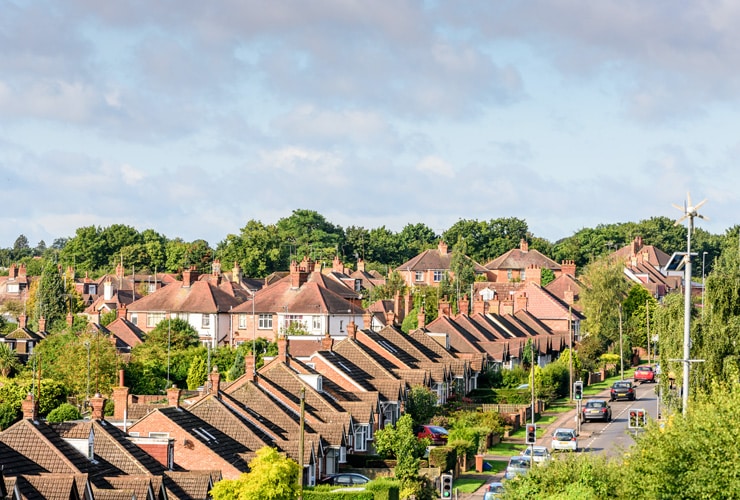Is Flipping Houses a Profitable Strategy?
Flipping houses is a popular strategy among property investment companies, and it is appealing to investors in the current property market due to its potentially high returns.
It can come with significant risks and rewards however, and not for the faint of heart or investors looking for a guaranteed outcome. For those investors who are up for the challenge of flipping, they can see great results from doing only one main project a year. Below, we look at how this strategy works.
For other property investment approaches, you can check out our article comparing our top buy-to-let strategies here.
Article updated: October 2025

-
by Robert Jones, Founder of Property Investments UK
With two decades in UK property, Rob has been investing in buy-to-let since 2005, and uses property data to develop tools for property market analysis.

How does Flipping Houses Work?
The house flipping strategy works by buying a house at a low price and then reselling it at a higher price within a relatively short period of time (months, not years).
Flipping houses is not the same as buy-to-let, as the property is not rented out during your ownership.
Nor is flipping technically the same as property development, renovation, or the buy-refurbish-refinance strategy.
When you buy a house to flip, you do not let it out, nor do you always undertake substantial renovations or improvements.
The sole objective is to
- Resell the property for the highest return on investment possible
- In the quickest time as possible
That's it.
This requires buying the property at the best price and acting with speed.
Flipping houses is a buy-low, sell-high strategy. You need to be able to find great deals and look for motivated sellers who have equity in their home and can take a lower-than-market-value offer.
Flipping houses is also sometimes known as buy-to-sell and property trading.
Access our selection of exclusive, high-yielding, residential investment property deals and a personal consultant to guide you through your options.
Why Flip Houses for Profit?
Flipping is different from any other property strategy.
Most property investment strategies are generally regarded as long-term strategies and the goal is to earn rental income and achieve capital growth over a number a years.
For this reason, investors who are looking for the short-term hit often ask "is buy-to-let worth it?"
Because you have to be in it for many years before you see profits.
Hence the saying from landlords of
don't wait to buy property, buy property and wait.
Property flipping is the strategy of choice for investors looking for quicker turnarounds, and it is more suited to trader-type mentalities than a long-term investor.
Take property development
When you consider that property developers or investors often target 20% returns on a flip project. If they are invested at £200k and targeting a return on investment of £40k (20%), if this was achieved in one year, it is a great return.
Now consider property flipping
An investor purchases a property off-market, at £180k all in (as in all buying and selling costs) that is worth £200k on the open market.
Then sells it 3 months later and nets £190k. Providing a win for the new buyer and a £10k profit. That £10k profit in 3 months is the same pro rata profit of the developer.
Of course, there are different risks involved, but you can see why it is appealing to traders.
Because of this, house flipping can be seen to sometimes provide a higher return on investment or ROI than other strategies like owning a holiday cottage or buying a holiday let, which is often considered one of the highest returns for a longer-term rental strategy.
Many house-flipping projects also involve much less work than other types of larger-scale development projects, like conversions, planning gain or back-to-brick renovations, and are much quicker than other strategies like land banking.

How to Flip Houses Profitably
Successful house flipping requires solid planning, good research and a strong idea of your costs.
These are non-negotiable skills in order to get the best outcome and maximise your profits.
You can break these down in too stages.
Look to buy below market value.
You make your money when you buy, not when you sell
This is an old saying in real estate around the world.
Essentially, you need to buy at the right price. If you overpay at the beginning, it can be difficult to make money.
You should always aim to buy a property under its full market value.
Finding houses off-market can be a great way to do this. By negotiating a deal directly with the seller at a keen price without any other buyer competition.
Then, aim to resell to another buyer, using all the property portals available to you to sell 'on the market' and achieve the full market value.
Estimate buying costs carefully
Estimate likely legal fees, calculate stamp duty you will need to pay and any other costs such as finance charges and interest.
Also, allow for any costs you might incur while you own the property, such as utility costs, insurance and possibly Council Tax. You can even make a saving and reduce your council tax costs during ownership, if you think you are on an incorrect rate you can challenge your council tax band, moving from a band D to a band C for example can be a significant saving of over £1,000+ per annum.
Estimate selling costs carefully
The good thing is you can estimate many of your buying, holding and selling costs before you purchase a property. You can estimate the likely estate agent's costs, the marketing costs and any legal and conveyancing costs you might need to pay based on your purchase price. You can even calculate your potential tax on profits like Capital Gains Tax so you know the net results of your property sale.
Most house-flipping projects generally do not involve major work (and you are unlikely to consider major works like houses with subsidence issues). This is because major works can involve uncertain timescales and costs, which affect the viability of the project, which property flippers are trying to avoid.
However, you should calculate any repair and refurbishment costs in fine detail. This is the key to a successful house flip, keeping your costs in line.
You will also have holding costs like utilities, insurance, finance and council tax. Depending on your local council, you may be able to claim a council tax discount.
Consider house price trends
National and local house price trends matter.
At a national level, market sentiment is very important as it impacts how active buyers are. Imagine a news article that comes out confirming an increase in the Bank of England base rate and therefore the financing costs of mortgages.
Or new legislation that increases the cost of stamp duty to buy a house. The impact this has on your future buyer could be huge and could, at best, delay your sale and at worst mean you sell at a lower price as buyers' budgets are stretched.
At a local level, house price trends can be spotted by looking at UK House Price Index Data from HM Land Registry. Here you can see actual property sold prices in any location. The data is 3 months behind the todays sales as it takes time for them to be recorded but it can directionally show you what way house prices are heading.
You could also obtain opinions from local estate agents, but take take these with a pinch of salt as they are incentivised to make sales and may not be 100% accurate on what the whole of the market is doing.
Time everything carefully
Timing is everything. A property that sells in 2 months can be highly profitable. If the same property takes 12 months to sell and you could be looking at a loss. If you have high holding costs, expensive financing costs, or the market turns and prices start to dip or stagnate and your flipping business could be making a loss.
To be profitable, house flipping projects should be completed within a short time period, under 6 months is a good target, but you need to plan for the worst too and budget for a longer sale in case property buyer sentiment shifts.
You might also aim your purchases for a specific time of year. This can be risky, as you are then more focused on timing the market than finding the very best buy to let investment.
However, if you can buy a property around Christmas when very few buyers are looking, you may be able to pick up a great deal and negotiate a discount with the property seller at a time when they may be motivated to agree a sale.
How to Estimate Whether Flipping may be Profitable
A simple calculation can be used to help estimate whether flipping may be profitable:
Possible flipping profit =
Likely buying price
Plus likely buying costs
Plus likely repair costs
Plus likely selling costs
= Total costs
Subtracted from likely selling price
You can estimate the possible return on your investment or ROI by dividing the profit by the total investment.
For example, if you buy a property for £220,000, your costs are £30,000, and then you resell it for £300,000 your return on investment will be £50,000/£250,000 x 100 = 20%.

When does Flipping Houses Work Best?
It is very important to point out that a house flipping strategy works best in hot or warm property markets. That is, when there are lots of buyers and fewer sellers and when prices are rising.
In these kinds of markets, there is the possibility that you will be able to resell at a higher price than you buy simply because property prices overall are rising. This is in addition to any gain you might make from buying at below-market value or carrying out any improvements.
A house flipping strategy may not be as effective in cool property markets. That is, when there are fewer buyers and many sellers and when prices may be level or even falling. House flipping can still be a profitable strategy in these market conditions, especially when buying a house well under market value. However, there is an increased risk that it may not be possible to resell at a higher price.
So, is Flipping Houses still a Profitable Strategy?
Whether or not flipping houses is likely to be a profitable strategy depends on two main factors:
Firstly, how accurately you are able to estimate buying and likely selling prices and related costs.
Secondly, how do you see property prices performing over your time of ownership? If you take too long to develop or simply sell the property it gets harder and harder to predict the market and ultimately your selling price as over a long time line the property market is difficult to predict. There are trends like the 18 year real estate market cycle which show when a potential UK house price crash could be coming.
If you plan to see house prices in the UK rising, then flipping houses can be a potentially profitable strategy. If you see house prices in the UK falling, then flipping houses can be very difficult unless you buy exceptionally well and negotiate a discount on the house price.
Here’s what some industry experts forecast:
- Knight Frank forecast that house prices will grow by 2.5% in 2025, 3% in 2026 and 3.5% in 2027.
- Savills predict UK house prices growing stronger, with a forecast of 4% in 2025, 5.5% in 2026 and 5% in 2027.
It is important to do your own research to help you decide. Check out specific location guides as each region and city will be different to national growth averages. For example if you are looking at buy-to-let in Brighton or Isle of Wight, they will be very different markets.
Therefore the answer as to whether flipping houses is still a profitable strategy is – yes, in some locations and for some property types. But it depends greatly on your local property data.
